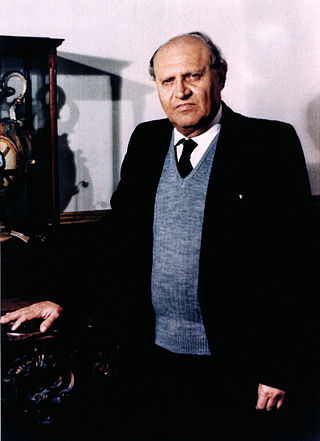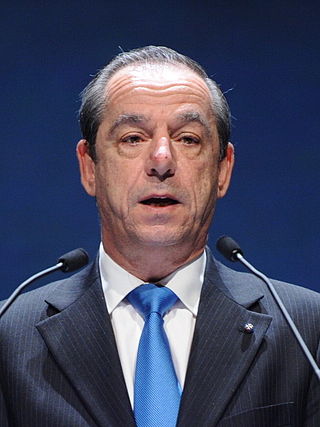
The politics of Malta takes place within a framework of a parliamentary representative democratic republic, whereby the president of Malta is the constitutional head of state. Executive authority is vested in the president of Malta, with the general direction and control of the Government of Malta remaining with the prime minister of Malta, who is the head of government and the cabinet. Legislative power is vested in the Parliament of Malta, which consists of the president of Malta and the unicameral House of Representatives of Malta with the speaker as the presiding officer of the legislative body. Judicial power remains with the chief justice and the judiciary of Malta. Since independence, the party electoral system has been dominated by the Christian democratic Nationalist Party and the social democratic Labour Party.

The speaker of the Australian House of Representatives is the presiding officer of the Australian House of Representatives, the lower house of the Parliament of Australia. The counterpart in the upper house is the president of the Senate. The office of the speakership was established in 1901 by section 35 of the Constitution of Australia. The primary responsibilities of the office is to oversee house debates, determine which members may speak, maintain order and the parliamentary and ministerial codes of conduct during sessions and uphold all rules and standing orders. The current speaker of the House of Representatives is Milton Dick, who was elected on 26 July 2022.

In New Zealand, the speaker of the House of Representatives, commonly known as the speaker of the House, is the presiding officer and highest authority of the New Zealand House of Representatives. The individual who holds the position is elected by members of the House from among their number in the first session after each general election. They hold one of the highest-ranking offices in New Zealand. The current Speaker is Gerry Brownlee, who was elected on 5 December 2023.

The prime minister of Malta is the head of government, which is the highest official of Malta. The prime minister chairs Cabinet meetings, and selects its ministers to serve in their respective portfolios. The prime minister holds office by virtue of their ability to command the confidence of the Parliament, as such they sit as members of Parliament.

Pawlu "Paul" Xuereb was a Maltese politician who served as the Speaker of the House of Representatives of Malta from July 1986 to February 1987 and the acting president of Malta from February 1987 to April 1989.
In many parliaments and other similar assemblies, seating is typically arranged in banks or rows, with each political party or caucus grouped together. The spokespeople for each group will often sit at the front of their group, and are then known as being on the frontbench and are described as frontbenchers. Those sitting behind them are known as backbenchers. Independent and minority parties sit to the side or on benches between the two sides, and are referred to as crossbenchers. Frontbenchers may be part of a Frontbench Team with other members of their political party.

Lawrence Gonzi is a Maltese politician, retired Nationalist politician and lawyer, who served for twenty-five years in various critical roles in Maltese politics. Gonzi was Prime Minister of Malta from 2004 to 2013, and leader of the Nationalist Party. He also served as speaker of the House from 1988 to 1996, and Minister of Social Policy from 1998 to 2004, as well as deputy prime minister from 1999 to 2004. He served in practically all positions in Parliament, being also Leader of the House, an MP and Leader of the Opposition.

The Council of Representatives is the de facto unicameral legislature of the Republic of Iraq. According to the Constitution of Iraq, it is the lower house of the bicameral legislature of the country. As of 2020, it comprises 329 seats and meets in Baghdad inside the Green Zone.

The Parliament of Egypt is the bicameral legislature of the Arab Republic of Egypt. It is composed of an upper house and a lower house.
A parliamentary leader is a political title or a descriptive term used in various countries to designate the person leading a parliamentary group or caucus in a legislative body, whether it be a national or sub-national legislature. They are their party's most senior member of parliament (MP) in most parliamentary democracies.

The House of Representatives is the lower house of the National Assembly of Thailand, the legislative branch of the Thai government. The system of government of Thailand is that of a constitutional monarchy and a parliamentary democracy. The system of the Thai legislative branch is modelled after the Westminster system. The House of Representatives has 500 members, of which 400 are elected through single member constituency elections, while the other 100 are chosen through party lists parallel voting.
In a governmental system, a party leader acts as the official representative of their political party, either to a legislature or to the electorate. Depending on the country, the individual colloquially referred to as the "leader" of a political party may officially be party chair, secretary, or the highest political office.

In Malta, The Leader of the Opposition is, by convention, the leader of the largest political party in the House of Representatives that is not in government.
Charles Mangion was a Maltese politician. He was a Member of Parliament in the House of Representatives of Malta from 1987 till 2017. He has served in the government as Minister of Justice and Local Government from 1996 to 1998. He was briefly Acting Leader of the Opposition in 2008.

Angelo "Anġlu" Farrugia is a Maltese politician and the current Speaker of the House of Representatives of Malta. Previously he served Deputy Leader of the Labour Party, a Member of Parliament and Shadow Minister for work, workers' rights and parliamentary affairs.
Louis Galea is a Maltese politician who was Malta's representative on the European Court of Auditors from 2010 till 2016. Previously he served in the government of Malta as Minister of Education from 1998 to 2008 and was Speaker of the House of Representatives of Malta from 2008 to 2010.

The Speaker of the House of Representatives of Malta is the presiding officer of the House of Representatives of Malta. The Speaker is responsible for controlling the flow of House business and acts as "referee" during debates. It is the Speaker's duty to ensure that the rules of the House for conducting its business are followed and that all Members of the House have an opportunity to take part in debates. Balancing the right of the majority to conduct business with the right of the minority to be heard is one of the Speaker's most difficult tasks. Because it is essential that the Speaker be seen to be above party politics, he/she does not take part in debate or vote, unless there is a tie. When there is a tie, the casting vote is conventionally used in a way to promote further discussion in the house rather than ending the debate. All remarks made in the House must be addressed to the Speaker, and no Members may stand when the Speaker is standing.
The Maltese order of precedence is a conventionally set list. It is only used as a guide for protocol.

The Parliament of Malta is the constitutional legislative body in Malta, located in Valletta. The parliament is unicameral, with a democratically elected House of Representatives and the president of Malta. By constitutional law, all government ministers, including the prime minister, must be members of the House of Representatives.







































